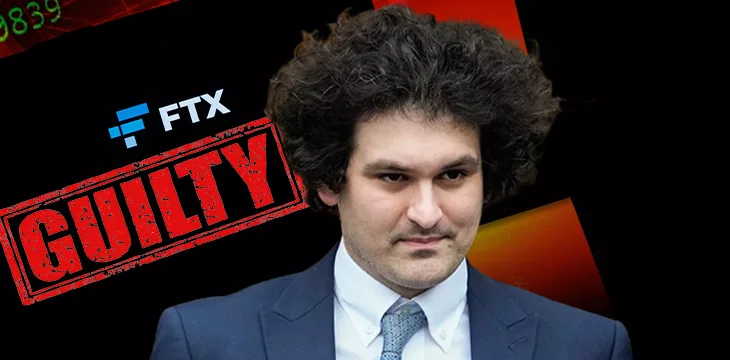|
Getting your Trinity Audio player ready...
|
Sam Bankman-Fried, founder of notorious digital asset behemoth FTX, has been found guilty on seven counts of wire/securities fraud and conspiracy. After a New York trial that lasted five weeks, jurors took just over four hours to convict the 31-year-old entrepreneur, verdicts that were welcomed with celebrations and champagne-popping GIFs in the digital asset trading world.
Bankman-Fried, or “SBF” as he was commonly known in the digital asset world, faces a potential maximum 115-year prison sentence for (among other things) using $8 billion in FTX customer and investor money to purchase non-blockchain assets like sports sponsorships and real estate and make large donations to Democratic political campaigns.
Following the unanimous verdict, Judge Lewis Kaplan gave “crypto” speculators a further five months of salivating expectations, setting a tentative sentencing date in March 2024. SBF’s sentence may end up being far less than the term of his natural life, but it’s expected to be significant. He’s also likely to appeal the conviction.
The jury verdict came on the event’s anniversary that kicked off the public segment of FTX and SBF’s demise. News site CoinDesk published documents showing much of FTX and Alameda Research’s (SBF’s trading firm and one of FTX’s largest customers) holdings were in FTT, FTX’s native digital asset.
Binance wrecks FTT, starts the ball rolling on SBF’s downfall
Binance CEO Changpeng “CZ” Zhao, an early FTX investor who had been in negotiations for a possible takeover of the exchange, later posted on X (formerly Twitter) that his company would completely sell its FTT holdings. This led to an 80% FTT price collapse, dragging FTX and Alameda down.
Prosecutors said FTX and Alameda had used a series of back-end processes to shuffle billions of dollars in customer and investor funds between FTX and the latter’s trading account, giving it access to a virtually unlimited credit line.
SBF was arrested by Bahamas police in December 2022, a few weeks after FTX first declared bankruptcy. After spending 10 days in a local prison, he was extradited to the United States, where New York’s Southern District Court allowed him to live under house arrest at his parents’ home for a $250 million bond. That bond, a record for a U.S. criminal trial, was paid virtually instantly.
Following further allegations of bail condition violations, including witness tampering, SBF was returned to jail in July 2023, where he complained of his lack of access to vegan cuisine and the ADHD drug Adderall and reportedly lived on bread, peanut butter, and water.
The extent to which FTX’s fraud and downfall were due to SBF’s overbearing management style and personal bullying, or the FTX/Alameda executive teams’ incompetence, occupied much of the courtroom debate. The fraud records had already been laid bare, so it was just a matter of who ordered it.
CTO Gary Wang, Head of Engineering Nishad Singh, and Alameda CEO Caroline Ellison, were also arrested in the U.S. and charged around the same time as SBF. However, while Bankman-Fried was still unlucky enough to be incarcerated in Nassau, the three made deals with New York prosecutors and testified against SBF at the trial.
It was their testimonies that eventually proved most damning for SBF (although his own public admissions and courtroom behavior hardly helped). They also served as prime entertainment for blockchain’s online peanut gallery, who mercilessly mocked the team’s physical appearance and their tales of FTX/Alameda’s bizarre corporate culture as the companies achieved rock-star status.
From fame to fraud (may not be in that order)
SBF achieved marketable fame with his rapid rise, afro hairdo, and a claimed dedication to the 21st-century economic fashion of “effective altruism.” In reality, he and his team lived an opulent and frequently decadent lifestyle at their base in the Bahamas, deliberately downgrading their cars and clothes to appear more modest in media presentation. At his peak, Forbes listed him as the 41st richest person in the U.S., with a net worth of $26 billion.
SBF was virtually unknown in the Bitcoin and blockchain world before FTX launched, yet the exchange quickly became one of the industry’s players. Large investors leaped in to ride the opportunity, FTX bought up sponsorship rights to sports arenas, and there was even talk of them attempting to corner the “crypto” market by buying up startups who’d struggled in the wake of 2021’s digital asset bull run and crash.
Today’s swift and unanimous verdict confirms what we already knew: that SBF misled and deceived so many, from customers and employees to business partners and investors, including myself and Sequoia.
— Alfred Lin (@Alfred_Lin) November 3, 2023
He made himself open and available at every opportunity, and SBF’s distinctive head was ubiquitous in interviews and online discussions. These continued even after his arrest and extradition. Ultimately, this tendency to over-share contributed to his downfall, giving prosecutors and commentators ample material for pull quotes that often contradicted his denials after FTX hit its wall.
Multiple attempts by SBF to claim his wrongdoings were simple “mistakes” and carelessness during his testimony didn’t jive with prosecutors or the jury. There was notable irritation from the court and online observers at his constant replies of “I don’t recall” to multiple courtroom questions and attempts to redefine in-house concepts like “allow negative” (account balance) and others that gave Alameda an unfair (and expensive) advantage over the exchange’s other customers.
Follow CoinGeek’s Crypto Crime Cartel series, which delves into the stream of groups—from BitMEX to Binance, Bitcoin.com, Blockstream, ShapeShift, Coinbase, Ripple,
Ethereum, FTX and Tether—who have co-opted the digital asset revolution and turned the industry into a minefield for naïve (and even experienced) players in the market.

 02-15-2026
02-15-2026 




